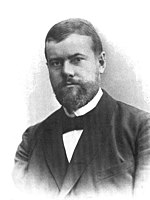Portal:Society/Selected article/11

Maximilian Carl Emil Weber (German pronunciation: [maks ˈveːbɐ]) (21 April 1864–14 June 1920) was a German lawyer, politician, historian, political economist, and sociologist, who profoundly influenced social theory and the remit of sociology itself.[1] His major works dealt with the rationalization and so-called "disenchantment" which he associated with the rise of capitalism and modernity.[2] Weber was, along with his associate Georg Simmel, a central figure in the establishment of methodological antipositivism; presenting sociology as a non-empirical field which must study social action through resolutely subjective means.[3] He is typically cited, with Émile Durkheim and Karl Marx, as one of the three principal architects of modern social science.[4] Indeed, Weber has been described as "the most important classic thinker in the social sciences." [5]
Weber's most famous work is his essay in economic sociology, The Protestant Ethic and the Spirit of Capitalism, which also began his work in the sociology of religion. In this text, Weber argued that religion was one of the non-exclusive reasons for the different ways the cultures of the Occident and the Orient have developed, and stressed that particular characteristics of ascetic Protestantism influenced the development of capitalism, bureaucracy and the rational-legal state in the West. The essay examines the effects Protestantism had upon the beginnings of capitalism, arguing that capitalism is not purely materialist in Karl Marx's sense, but rather originates in religious ideals and ideas which cannot be solely explained by ownership relations, technology and advances in learning alone.[6]
In another major work, Politics as a Vocation, Weber defined the state as an entity which claims a "monopoly on the legitimate use of violence", a definition that became pivotal to the study of modern Western political science. His analysis of bureaucracy in his Economy and Society is still central to the modern study of organizations. Weber was the first to recognize several diverse aspects of social authority, which he respectively categorized according to their charismatic, traditional, and legal forms. His analysis of bureaucracy thus noted that modern state institutions are based on a form of rational-legal authority. Weber's thought regarding the rationalizing tendencies of modern Western society (sometimes described as the "Weber Thesis") would come to facilitate critical theory, particularly in the work of thinkers such as Jürgen Habermas.
| ...Archive | Read more... |
- ^ "Max Weber." Encyclopædia Britannica. 2009. Encyclopædia Britannica Online. 20 Apr. 2009. [1]
- ^ Habermas, Jürgen, The Philosophical Discourse of Modernity, Polity Press (1985), ISBN 0-7456-0830-2, p2
- ^ Weber wrote his books in German. Original titles printed after his death (1920) are most likely compilations of his unfinished works (note the 'Collected Essays...' form in titles). Many translations are made of parts or sections of various German originals, and the names of the translations often do not reveal what part of German work they contain. Weber's work is generally quoted according to the critical Gesamtausgabe (collected works edition), which is published by Mohr Siebeck in Tübingen, Germany. For an extensive list of Max Weber's works see list of Max Weber works.
- ^ http://plato.stanford.edu/entries/weber/ Max Weber - Stanford Encyclopaedia of Philosophy
- ^ Radkau, Joachim. Max Weber: A Biography. Polity Press. ISBN: 9780745641478
- ^ Weber, Max The Protestant Ethic and "The Spirit of Capitalism" (1905). Translated by Stephen Kalberg (2002), Roxbury Publishing Company, pp. 19 & 35; Weber's references on these pages to "Superstructure" and "base" are unambiguous references to Marxism's base/superstructure theory.
